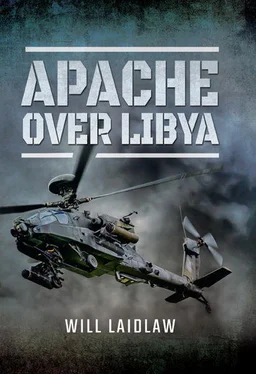Of course the obvious fix to all this is to make the aircraft float. But floatation kit was on no one’s scratchpad. It didn’t need to float in Afghanistan, so why go to the expense of retrofitting the kit? The calculation was all a reasonable balance of money (not much of that), risk (lots of that, but only if you fly it over water) and operational output (that depends what you want). [2] Floatation Gear and a Canopy Jettison System safe to use underwater were explored after our experience at sea and are now MoD-funded projects
In the absence of floatation gear and a more friendly canopy jettison, we would have to get the canopy off prior to entering the water and then fight to get out before the plummeting aircraft took us too deep. With all the additional weight of ammunition and survival equipment attached to our body armour, the egress had to be very quick.
The daily challenges were diverse. I had to enter the debate on why we were developing a capability that did not contribute to operations in Afghanistan as well as facing a conceptual challenge in designing new ways of using the aircraft. It was also a significant engineering project. Then we had the practical ‘how to fly it’ and ‘how to escape it’ issues too. The squadron was very busy and I wanted both our tasks to work, but at times it seemed we lacked understanding from our wider community as everyone else was fully committed to the cycle of Afghanistan tours.
Set against criticism that it was needlessly risky, probably not worth it and just a distraction from current operations, I could only agree that it did not warrant the full backing of those not involved. Why should they care? The more career-ravenous around me saw it as an opportunity to exploit – 656 was no longer on the front line, not a proper squadron, the only one of six front-line Apache squadrons not due to feature on the Afghanistan ORBAT. Consequently, this made for some lonely times in 2010. I was just dreaming up ideas, most of them involving a ship – none of which had much relevance to the reality of ongoing conflict in Helmand. Nothing I was doing was contributing to the immediate need, yet I was consuming resources and adding strain to the flying programme. My activities were irrelevant to those who were dealing exclusively with Afghanistan. Some were not content and sought to limit my ambition, others tolerated it as a sideshow to their much more important work. At the time I found this frustrating, but on reflection theirs was a reasonable response. If landlocked Afghanistan was the only war, then training at sea with an Army helicopter was a ridiculous idea. Only a fool would believe such a digression would yield operational utility.
Solving the maritime problems had to be a state of mind as well as an act in itself. We had to embrace the project and deal with all the other obstacles that came our way. We believed in the task and we were determined to make it work. To us this was a challenge worth taking on (and we had no choice). I dealt with the ‘what’s the point?’ debate constantly during my tenure in command, although, not surprisingly, this argument largely went away after Libya. However, in 2010 my biggest concern was how to fly, sustain and then escape the aircraft if it all went wrong over the sea.
My first task was overcoming the technical challenges. There would be no chance of testing the operational utility of the aircraft if we could not maintain, re-arm and refuel it as well as safely move it around the ship from hangar to flight deck. At the same time I had to let go most of my aircrew to reinforce the Afghanistan squadrons, leaving me with a skeleton crew of pilots able to take the maritime development forward, while all the other squadron aircrew were fully committed to teaching CTR. It was all change, all of it resource-driven, and 656 had to settle with everyone else’s Afghan leftovers and make do.
When it comes to change and managing people within change, there will always be about twenty per cent who will take on the change and embrace it, whatever it is – the energetic enthusiasts. Similarly, there will always be another twenty per cent who will never embrace it – the pessimists. They have to go. If they are not part of the team, yet have an influence on how it is resourced and operates, they have to be convinced, marginalised or confronted. This can be problematic in an institution where seniority assumes superiority – expert, experienced, qualified or not. If the negative twenty per cent are senior executives in an institution constructed around vertical hierarchies, delicate diplomacy and persuasive advancement of your case is the only way of balancing their voice. In our project a naysayer would occasionally raise an eyebrow and offer criticism, often based on amateurish advice, for example: ‘The undercarriage is too narrow, it will fall overboard.’
As a subordinate, I would be duty-bound to answer, ‘No it won’t, we’ll lash it down, just like they do with everything else.’
Then they would counter with a typical ‘Yes, but what does it do for Afghanistan?’ comment, and I would be left without an answer.
The technical challenge was a relatively straightforward issue of trials, training and practice before going to sea, then running live serials to prove the capability. Much more subtle was the people dimension. With forty per cent already accounted for, the enthusiasts and the pessimists, the middle sixty per cent then had to be persuaded that the cause is worthwhile and that your leadership is worth following. This could only be done with time and action.
In October 2010 we got our chance. HMS Ark Royal was available, as was the north coast of Scotland, and seventy soldiers, three aircraft and three weeks in the fifth and last Ark Royal gave us the building blocks to make our project happen. Cape Wrath in early winter with sea state seven and driving rain was our first outing! On some days the entire ship’s company were taking seasickness tablets, on others the sun shone and we launched. We had both the Shippers with us, Big and Little. If your heritage is Royal Navy and you are on loan to the Army, then ‘Shippers’ is your name. We had two of them. One was bigger and older than the other: Big Shippers and Little Shippers, everyone knew who they were. It had been a few years since anyone had been to sea in an Apache, and it was down to these two to unravel the mystery and make sense of it all.
A Royal Navy Lieutenant Commander with seven years experience on the Apache, Big Shippers was part of Army Aviation Flying Standards, a powerful man in our world, one who could really make this thing work. Joining at nineteen as a midshipman, Big Shippers had lived a life in Royal Navy and Army aviation. He knew his way around both communities and was highly regarded on land and sea. He was an expert, a genuine, detailed expert. He knew the envelope of the Apache in such technical depth that he became our go-to man with the ‘will this work at sea?’ questions. As a Standards examiner he also had a formidable reputation. All of us had been under his microscope before, be it in training or during a visit to the Regiment. The stern, analytical manner of the man disguised a wicked wit, which we got to know during the many ‘first night madness’ sessions when we took a break from operations during the summer of 2011. His flying portfolio was steeped in the skills we needed at sea and he became the crucial link – so crucial, in fact, that his scheduled return to the Royal Navy and the Sea King was delayed until after the summer of 2011. In Big Shippers we had a man who could write the new rules we needed.
The Shippers had to teach one another the deck landing procedure and then deliver the training to the rest of us. We were right at the start of our journey. We had barely any residual knowledge of flying the Apache at sea, just enough instructors with the right skills to redefine the training, and only the minimum of soldiers to make the whole enterprise happen. I leant heavily on Big and Little Shippers as well as the two Regimental instructors who came along to share the burden.
Читать дальше












